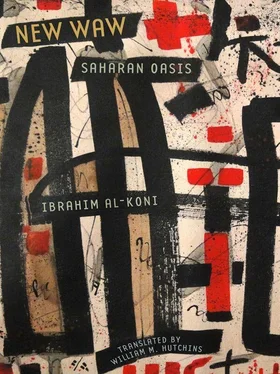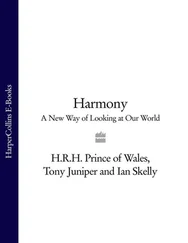Other migrating flocks rise in quick succession and follow each other into the void, which is harsh, stern, uncaring, and eternal. Their songs fade off in the distance, and the din of their melodies dies away, but the diviners continue to pursue them even after they disappear into the harrowing void, where they become part of it, an expression of the purity of the void, a part of it that fades and dissipates into nothingness.
Once the birds have departed, the camps revert to their former stillness and their lethal tranquility.
The diviners return the next day, bringing the prophecy back to the camp. They enter the leader’s tent and closet themselves with the leader for an entire night. When they emerge, they face the people, order the attack drums struck, summon the herald to tour the camps to advise the clans to migrate because a drought is coming, or send for the maidens, who will trill joyfully at news of the floods that the diviners have detected in the birds’ conduct.
That day the diviners had also spent the entire previous night alone with the leader. When they met with the people that morning, however, they did not order the drums struck, they did not summon the herald to inform the tribes of a drought, nor did they send for the maidens to trill joyously at the coming deluge they had detected in the flight of the birds.
On that day, when the sages silently left the leader’s tent, people could see depression and despair in their eyes and despondency and disappointment in their faces.
______________
1. A bowed, single-stringed Tuareg instrument traditionally played by women.
2. In the works of Ibrahim al-Koni, the Law is the lost but influential customary law of the Tuareg people — al-Namus.
3. In Tuareg culture, Waw (pronounced “wow”), although the name of some actual locations, refers to a paradise-like lost oasis, which is rediscovered only by a blessed few, especially wayfarers who are not seeking it.
But then a man didn’t need to have to keep his mind steadily on the ground after sixty-three years. In fact, the ground itself never let a man forget it was there waiting, pulling gently and without no hurry at him between every step, saying, Come on, lay down; I ain’t going to hurt you. Jest lay down.
William Faulkner, The Mansion, Chapter 18
1
Why do the tribes move about? Why do they traverse an area and head to a more distant one? Do they do this to leave a land threatened by drought and famines in search of a land that promises ample grazing? Do they set forth because they fear the ancient prophecy that warns that remaining in one place for forty days invites servitude to the land? Do they migrate because the Law has said that death on camelback is the destiny reserved exclusively for noble nations? Or do their sages inspire the masses to migrate in search of water and grass even though they actually travel in response to another unknown call they do not disclose even to themselves?
Tribesmen understand that the turbans of the wise conceal many secrets. They know that the leader would not have become a leader, the diviner a diviner, and the sage a member of the council of noble elders if this leader, diviner, or sage had not withheld some secret, because anyone who is so tyrannized by his tongue that he fails to keep a secret isn’t granted wisdom or authority over other creatures. For this reason, tribes respond to the diviner’s prophecy, yield to the advice of the sage, and obey the leader’s order. Then they set forth in groups behind any caravan the leader allows to depart and halt when the leader orders them to.
But the tribesmen also know that misfortune awaits tribes if the age frowns on them and discord enters the council of the wise or if disorder finds its way into the leader’s tent.
2
When the tribes of the sky disappear into the sky’s labyrinth, they leave behind them stillness, despair, and sad, miserable birds that are too ill, wounded, or old and infirm to continue the migration and follow their tribe.
On this most recent journey, the departing celestial tribe left behind an aged crane. Nobody noticed him the first day, perhaps because the terrestrial tribe was consumed by the anguish that the birds’ disappearance had caused or perhaps because the sorrow that the people of the sky had left behind with the tribe was vaster than the wasteland itself, swallowing the wasteland and concealing all the creatures that moved through it. According to the revealed law of diviners, sorrow blurs vision and actually blinds the eye. It is said that the sorrow the emigrant leaves behind in the hearts of those he quits exceeds the sorrow that the deceased bequeath to their kinsfolk. Sages offer many justifications for this. They say: “Travel and death are both eternal separations, but we can erect awe-inspiring monuments for our dead, stone tombs that we visit during festivals and that we sleep on by night to gain prophecies, which warn us against an enemy, an epidemic, or a drought. Moreover, when the jinn become unruly and upset us, we go to these tombs, dig up their stones, and remove the bones of our dead to use for talismans we carry on our travels and employ to ward off the people of the Spirit World. Family members who leave to take a distant trip, however, vanish. We cannot find their burial places or locate any trace of them.”
There is, however, another cause for the painful sorrow with which desert tribes normally say farewell to travelers. This is an obscure reason that tribes sense but do not understand. Sages know it but persistently conceal it from themselves. A confused, murky token whispers in their breasts with a murmur like wind rustling. It says that only the wayfarer is promised entry to Waw, that only the traveler can locate the errant continent, and that only a traveler dandles in his heart the hope of reaching the lost oasis. All the same, the traveler is ignoble, conceals his hope by compartmentalizing it, and tries to convince himself that there is no hope, because he knows that if he does not conceal this hope from his ego, it will conquer him and he will tell someone about his hope. Once the tongue utters the secret, the secret is ruined and the treasure — the gold dust — will turn to ashes. But the people seeing off the traveler are also ignoble, because they guess the truth and detect the traveler’s intent in his eye before they learn it from a slip of his tongue. Then temptation incinerates them, their breasts flare with longing, and envy torments them. So they weep. They weep not from sorrow about this separation but about the idea that a misguided, errant creature just like them — a wretch like any of them, someone who, like them, has never known whence he came or where he is heading — will find the track they haven’t and will be guided by the Unknown to the oasis that the desert’s inhabitants have been promised since they first came to the desert. Then he will never again know the suffering of this excruciating quest and longing’s pain will vanish from his heart, because the forgetfulness that Waw affords him is a panacea for the world’s ills. Then the equilibrium of things is reestablished, and the traveler, whom the wasteland has threatened with its labyrinth, becomes a newborn while the community that said farewell to him and that considered itself safe on account of its sedentary life becomes a desperate, wretched, lost people. When they weep, they do not weep for the newly lost traveler, even if he was their closest relative, but for themselves because they realize they are lost. Then the emigrant becomes an enemy even if he had once been their dearest friend or even their brother or father.
The birds fly off during the migratory season, and everyone returns to his personal concerns while combating an indecipherable longing, his longing for the Unknown from which he came one day borne on the wings of a bird, because the bird that brought him to the desert when he was an infant wrapped in the swaddling clothes of forgetfulness won’t be able to carry him back to the Unknown, to his homeland, now that he has outgrown them.
Читать дальше












